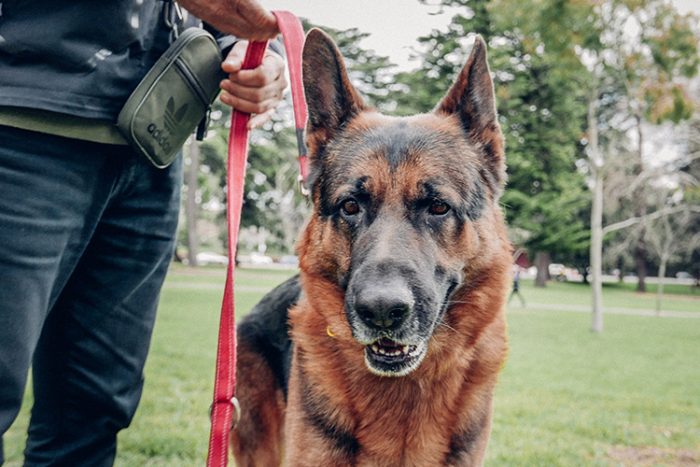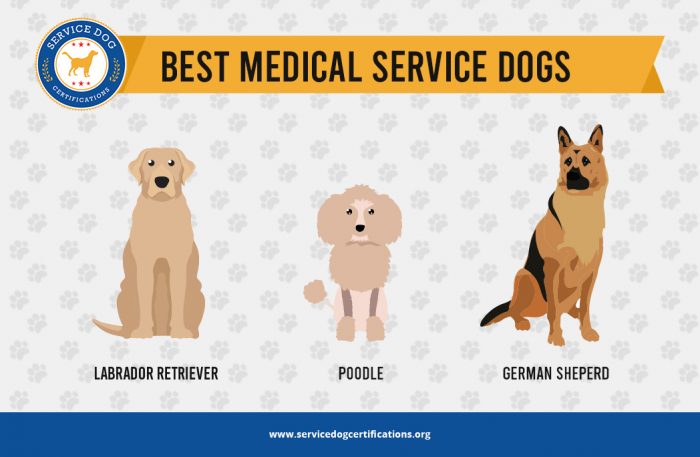Can You Get a Service Dog for a Heart Condition?

Quite a few of us have had a dog steal our hearts, but did you know they can also save it? Dogs provide companionship and comfort. But for people who struggle with dangerous heart conditions, service dogs can also help monitor their heart condition.
Medical Alert Service Dogs
Medical alert service dogs—or more specifically, Cardiac Alert Dogs—are service dogs trained to detect anomalies in heartbeats and blood pressure changes. When a sudden change occurs, a cardiac alert dog can spot the difference and alert their owner to the danger.
Because cardiac alert dogs play such a vital role in saving lives, they must learn how to detect cardiac changes accurately. To achieve this training level, cardiac alert dogs spend years learning how to recognize changes in pulse patterns and blood pressure. Sometimes, their training starts as young puppies, with almost daily sessions devoted to identifying heart changes.
When significant changes are observed, a cardiac alert dog may get its owner’s attention through a designated “alert behavior,” like pawing at their owner or laying on the ground. For example, if a sudden spike in blood pressure is detected, a cardiac alert dog may bump its owner repeatedly with its head until its owner responds.
How Much Does a Medical Alert Dog Cost?
The costs for a service dog can vary, depending on whether you train the dog yourself or purchase a fully trained dog. Although training a service dog yourself is the cheapest way, the cost savings come at another price: time and effort. Training a service dog takes consistency, routine, and a lot of time.
If you’re looking to purchase a medical alert dog, you may pay anywhere from $10,000–$25,000 for a fully trained dog. It’s important to buy the dog from a legitimate organization because, quite literally, your life depends on the dog you buy.
Whether you choose to train a medical alert dog yourself or purchase one, it’s an investment in your future and health. Medical service dogs provide companionship and peace of mind that isn’t available anywhere else.
Which Breeds are Good Medical Alert Dogs?
When choosing a medical alert dog, the breed matters. A dog breed known for its excellent sense of smell and hearing is the best choice. Discerning changes in heartbeats and blood pressure not only takes a keens sense of smell and hearing, but it also requires a dog to be attentive and not easily distracted. The following breeds are tried and true medical alert service dog breeds:

Labrador Retriever
Labrador Retrievers are one of the most popular dog breeds to have as pets, and they make ideal service dogs. Traditionally, Labrador Retrievers were bred as hunting dogs, which means they can follow directions and readily detect changes. A perceptive breed, Labrador Retrievers, are definitely up to the task of being a medical service dog.

Poodles
Poodles aren’t just pretty to look at, but they’re also intelligent and eager to please. What’s more, they have a sharp sense of smell and are often used for tracking purposes. Poodles are also hypoallergenic dogs and are ideal for people who are allergic to dog fur and dander.

German Shepherd
German Shepherds often function as police dogs because of their strong sense of smell, making them excellent medical service dogs. Along with their olfactory talents, German Shepherds are focused and calm. They don’t get distracted or rattled very easily and can stay on task for long periods. As medical service dogs, German Shepherds are a great option overall.
Finding Your Medical Alert Dog
If you’re interested in a medical alert or cardiac alert dog, speak with a licensed healthcare professional to see if one could benefit your situation. You may even qualify for discounts, grants, financial aid, veteran support, or donated service dogs if your physician recommends one. Depending on your environment and needs, finding the right service dog might take a bit of time. For example, a German Shepherd might make an excellent medical alert dog, but they’re not practical if you live in a small apartment or can’t afford the cost of care.
A medical service dog is a living animal and requires care and attention, just like a regular pet. They perform best when they have a solid bond with their owner. There are many factors to consider when searching for a medical service dog, and obtaining the right medical service dog is not easy, but it may save your life.
Let everyone know instantly your medical service dog is an indispensable part of your life with your Service Dog ID. Get your medical service dog registered below.
About the Author: The writing team at Service Dog Certifications is made up of folks who really know their stuff when it comes to disability laws and assistance animals. Many of our writers and editors have service dogs themselves and share insights from their own experiences. All of us have a passion for disability rights and animals.
12 comments
Leave a Reply Cancel reply
Latest Posts

Dangerous Materials Hiding in Your Dog Products
Jake’s German Shepherd began developing strange rashes around his collar. Three vet visits later, they figured out the leather was treated with chromium — a chemical that irritates sensitive skin. Jake had no idea his dog’s collar contained industrial chemicals. Most dog owners don’t know what goes into the products they buy. Many companies use […]

Read More

Can You Bring a Service Dog to a Basketball Game?
Yes, you absolutely can bring your service dog to basketball games. Whether you’re heading to your local high school tournament, a packed college rivalry game, or splurging on NBA tickets, the Americans with Disabilities Act protects your right to be accompanied by your service dog anywhere the public can go. When you arrive, venue employees […]

Read More

Best Pet Health Insurance Providers
If you own a pet, you know how important — and expensive — vet care can be. One way to offset those costs is to purchase pet health insurance. Like typical health insurance, pet insurance is available at many price points, and can cover all, most, or only some of your vet-related costs. It can […]

Read More





I need service dog to help me with my high blood pressure please where can i find one.
Your cardiologist might have a resource for you or even your health insurance.
Please find me. A dog
Looking for an agency that I can get a service dog for a heart condition
I am looking for a German Shepherd Cardiac Alert dog. I’ve contacted numerous places and they are taking applications right now. Is there any where you might lead me to talk to someone please?
Thank you
Jennifer
Unfortunately we do not provide referrals but wish you the best of luck in your search.
I know this is a very weird question, but I as a feline behaviorist I must ask. Is there any way that I could possibly train a cat to do this? I have high blood pressure, and one of my cats has taking a interest in my own health and making sure I’m okay. I know the government does not accept cats as service animals, but I beg to differ especially if they are trained right and have the right motivations like dogs do.
Unfortunately the ADA only recognizes dogs as service animals.
I have a history of heart problems from Tetralogy of Fallot to Murmurs, AFib, Bigimeny (not sure how it’s spelled) and PVCs. I have a 4 year old daughter. We have a dog but he’s getting on in age and not sure he can be trained for service dog. Would I qualify for one?
To qualify for a service dog, you need to meet two requirements: Your condition has to be considered a disability, and your disability must require a dog that performs a specific job or task.
What are the qualifications for a service dog? I have the following Liver and heart failure. I would like to find out what qualifies me and where I can find a service dog that would qualify for the Condition that I have
Please see this article for more information on disabilities that qualify for a service dog.